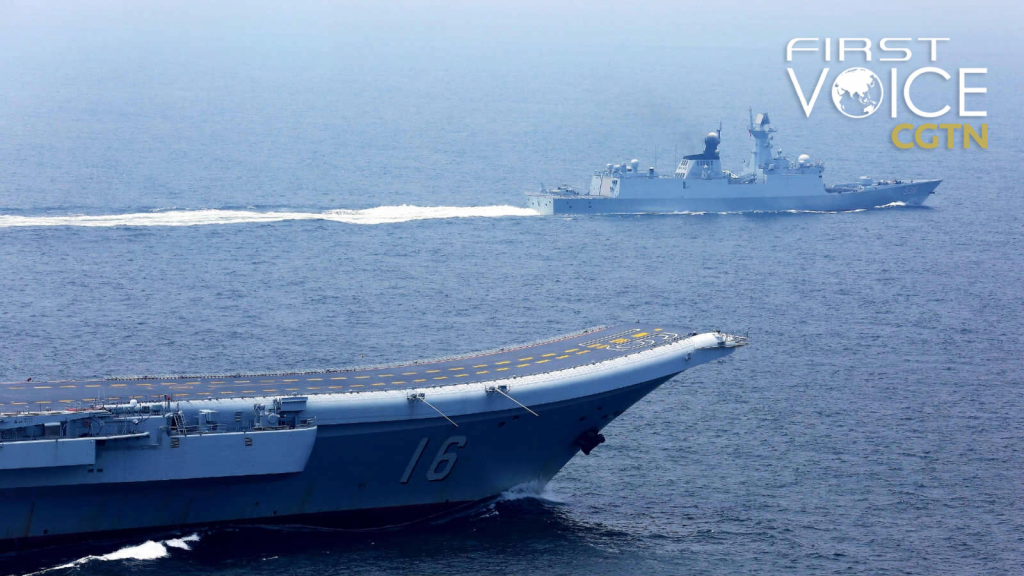
Canada, a vast country with a tiny military, is again colluding with the United States’ scattershot and confused efforts to slow China’s rise.
One would think Canada would be reluctant to team up with the U.S. again, after the baseless, politically motivated detention of Huawei CFO Meng Wanzhouon behalf of Ottawa’s U.S. masters led to no criminal charges.
During the Meng debacle, Canadians were infuriated after an admission by then-U.S. President Donald Trump that he was using Meng as a bargaining chip in trade negotiations.
One might think that Canada would want to mend ties with China, or even start to question the wisdom and judgment of its increasingly erratic southern neighbor.
But whatever you might expect, Canada last week sent its frigate HMCS Winnipeg to tag along with the missile destroyer USS Dewey through the Taiwan Straits.
The mission was ostensibly to protect “a free and open Indo-Pacific.”
However, it was unmistakably a signal from the U.S. meant to encourage separatists that are pushing hard to change the internationally agreed upon status quo across the Taiwan Straits and establish Taiwan as an independent nation.
The U.S., Canada and all major nations of the world have accepted the one-China policy, which is also recognized by the United Nations. But the U.S. seems ready to shred its international agreements.
The Trump administration’s efforts to slow the rejuvenation of China with a poorly thought-out and badly executed trade war failed miserably, and ended up hurting the U.S. economy twice over – first by reducing trade between the two nations, and second by scrambling global supply chains, triggering inflation in the United States.
The Biden administration has decided painting China as a villain is good politics. It wants to encircle China with military alliances, while at the same time tries to quietly retreat from Trump’s trade war.
However, a half-baked Cold War approach will be no more effective than Trump’s trade war. The reason is that the United States’ interests do not truly line up with its partners’.
Take Germany as an example. The Germans responded to U.S. pressure and sent a warship into the South China Sea earlier this year. However, the Germans were too cautious to send their boat through the Taiwan Straits. This is because Berlin has been able to negotiate and resolve trade issues with Beijing. Germany already makes a tremendous profit in the Chinese market, and sees great potential for expansion.
The U.S. is fearful that China will challenge American dominance in global affairs, but Germany is not particularly concerned about this. As a result, Germany made token efforts to cooperate with the Biden administration, but limited the scope of its move to protect its own commercial and national interests.
Canada cannot afford to be as independent as Germany, because it relies on the U.S. military umbrella for its security. In the meantime, the U.S. is its largest trading partner. That being said, China is Canada’s second-largest trading partner, with commercial ties growing stronger each year.
Meng Wanzhou, Huawei’s chief financial officer, makes a brief speech at the Shenzhen Bao’an International Airport in the southern Chinese city of Shenzhen, September 25, 2021. /Xinhua
The Biden administration may believe it is contributing to peace in the Taiwan Straits with a show of force meant to intimidate China from responding to unilateral changes to the status quo pushed by Taiwan separatist leader Tsai Ing-wen.
This is badly misreading the situation. The more boldly Tsai comes close to asserting Taiwan independence, the closer she comes to obligating China to make a forceful response.
China has been quite clear over the years that a declaration of Taiwan independence is tantamount to war.
U.S. and other foreign forces have meddled in China’s domestic affairs over the years by supporting separatist movements in Tibet, Xinjiang Uygur Autonomous Region, and Hong Kong Special Administrative Region. All of these efforts to stoke division in China have come to nothing. Why does the Biden administration think the result will be any different in Taiwan?
U.S. generals have told the U.S. Congress that the Chinese mainland is capable of holding on to Taiwan militarily. After all, the island is only 130 kilometers from the mainland across the Taiwan Straits, but 10,000 kilometers from the U.S. naval base in San Diego. The U.S. was incapable of winning a war half a world away against Taliban militants armed only with horses and light weapons – and no air force or navy.
What gives the U.S. confidence it could triumph in seizing an island from China, which has a powerful, advanced military?
In truth, when push comes to shove, U.S. allies will not be willing to send their offspring into battlefields over what ultimately is a Chinese domestic issue.
The U.S. has never committed to militarily aiding Taiwan separatists. Indeed, when Joe Biden was a senator, he said the U.S. should not do so.
Getting allies to send a ship on a symbolic protest is very different to getting allies to send their young people to die.
China is willing to negotiate and manage differences in U.S.-China ties while looking for common ground for cooperation.
U.S. efforts to heighten tensions and pick fights go in the opposite direction.
These efforts are poorly thought-out and seemed destined to lead to tragic results for the U.S. and any ally foolish enough to join it, as well as for the Taiwan island.
Cgtn.com
 Africa -China Review Africa -China Cooperation and Transformation
Africa -China Review Africa -China Cooperation and Transformation
